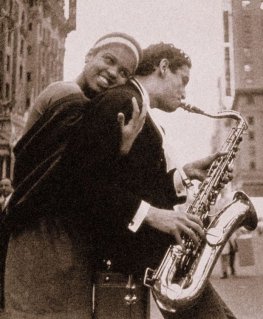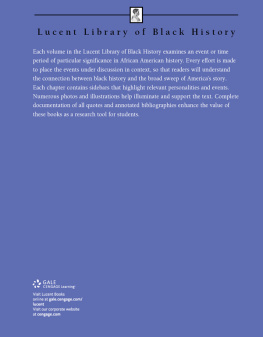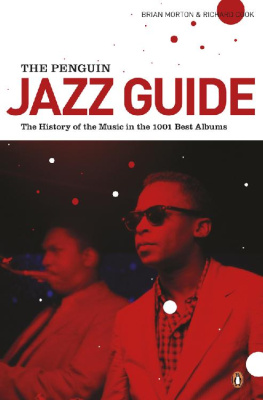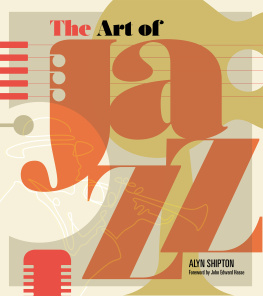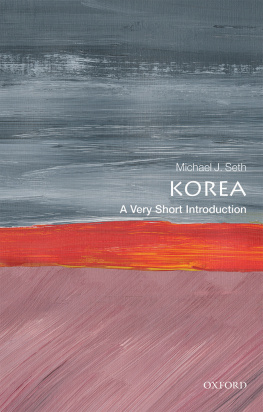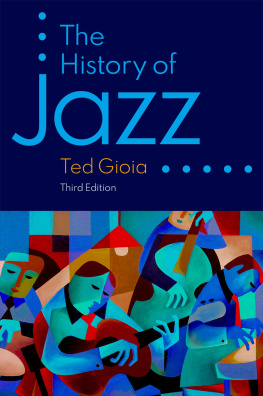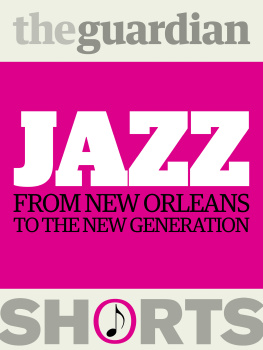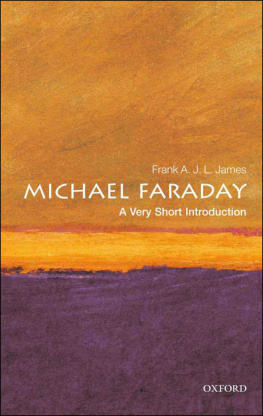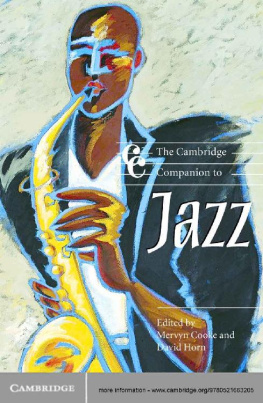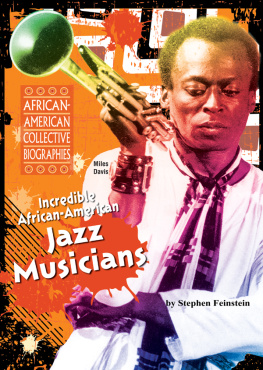Michael Morangelli - Jazz: A Short History
Here you can read online Michael Morangelli - Jazz: A Short History full text of the book (entire story) in english for free. Download pdf and epub, get meaning, cover and reviews about this ebook. genre: Prose. Description of the work, (preface) as well as reviews are available. Best literature library LitArk.com created for fans of good reading and offers a wide selection of genres:
Romance novel
Science fiction
Adventure
Detective
Science
History
Home and family
Prose
Art
Politics
Computer
Non-fiction
Religion
Business
Children
Humor
Choose a favorite category and find really read worthwhile books. Enjoy immersion in the world of imagination, feel the emotions of the characters or learn something new for yourself, make an fascinating discovery.
- Book:Jazz: A Short History
- Author:
- Genre:
- Rating:5 / 5
- Favourites:Add to favourites
- Your mark:
- 100
- 1
- 2
- 3
- 4
- 5
Jazz: A Short History: summary, description and annotation
We offer to read an annotation, description, summary or preface (depends on what the author of the book "Jazz: A Short History" wrote himself). If you haven't found the necessary information about the book — write in the comments, we will try to find it.
Jazz: A Short History — read online for free the complete book (whole text) full work
Below is the text of the book, divided by pages. System saving the place of the last page read, allows you to conveniently read the book "Jazz: A Short History" online for free, without having to search again every time where you left off. Put a bookmark, and you can go to the page where you finished reading at any time.
Font size:
Interval:
Bookmark:
Michael Morangelli
A Short History
1 Introduction
This series of articles for JazzFriends will hopefully offer a perspective on Jazz in a historical and cultural context - and I hope spark some discussion pro and con related to the themes covered in each. I will try to provide my research sources and some recordings to support the views expressed.
As this in an introduction to what I hope will be a complete series [over time], I thought I would outline the future content and also attempt to articulate the context in which I view the development of Jazz and the forces which shaped this music.
The outline is 7 broad categories: The earliest African/European cross culturalization The roots of Jazz before the turn of the Century The New Orleans/Chicago/Big Band Period to Mid-1950s The development of Bop and the resulting emphasis on Jazz as Concert Music [rather than a Functional Music] The immediate Post-Bop era to mid-1960 The Modal/Fusion development to late-1970 The stylistic fractionalization from l980 to the present The context is a little longer. So first, I wish to state, that I am self taught in this. I have no formal training in Jazz History - I am a Guitarist. That training was through private lessons and the musicians I worked with [all of whom worked or were taught by others who lived through the period from the late 20s on]. Second, I have no prejudices about what is Jazz [and Im not going to define what is or is not Jazz] - if it is honest and comes from a Jazz esthetic I will accept it, though I might not like it. And finally, I consider the Arts of a particular culture or era an access point into that culture or time period - provided you are willing to learn the esthetic language of the particular Art form [Music is often described as the Universal Language and I would disagree].
I view the history of Jazz as a cultural history of the United States- the good and the bad. Its roots developed from the mingling of cultures, the circumstances of which were, euphemistically, not the best.
That such a beautiful and enduring art form could spring from such circumstances is an amazement to me and a tribute to the strength and endurance of the human spirit. That it has become, in reality, an underground music in our present era is a constant grief.
When I decided to write this series I originally was going to jump right in and start on the subject immediately - I decided not to. Instead, this introduction became an important prelude for me. I teach Jazz Ensembles at small music center in Boston. I constantly, in that role, deal with highly motivated people who want to learn, want to play, and, for the most part, force time out of very busy schedules to participate. I thought it would be all theory and more theory. It was not. I found myself dealing with two major issues - Repertoire and Performance Practice. Neither of these are solely theory specific and so learning Jazz Theory,which essentially is the bebop tradition, will not generate an adequate vocabulary for performance. What was lacking, was an understanding of the different stylistic periods, the repertoire associated with those periods, and how to realize the melodic, harmonic, and rhythmic conventions within these styles - to my mind, a lack of historical perspective about the musical styles within the genre we call Jazz.
There is another consequence - a realization that Jazz is not a static language, but is constantly evolving.
The Music responds to the cultural environment which surrounds it - and our culture is certainly not static.
Recently, in response to Frequently Asked Questions about styles, I recorded some tapes for class use.
I recorded them chronologically from the early 1900s to mid 1990s. I had done this type of listening regularly when I was in college but that was 20 years ago. It turned out to be an education for me. I was comfortable with everything up to the early 1980s - then I had to struggle with what was new. The music had evolved and I had to catch up! Yet, I was able to find familiarity in much of what I listened to. But, I had to listen and draw upon my knowledge of what came before.
This whole episode put into perspective a simple statement from my college days - new is often a logical outgrowth or a reaction against previous practice - listening in this fashion illuminated this statement. By the way, this was advice from a professor in a History of Western Music Class. I had admitted no knowledge of the Classical repertoire or history. His advice preceding this statement was listen chronologically, choose what you like, identify what you dont, study both to understand why. I hope I never forget this and always apply it to my musical pursuits.
Again, I hope this Introduction will provide an orientation for the subsequent articles and spark some interaction with the themes of each.
2 Africa and Europe: Cross Culturalization
One of the things I find fascinating about Jazz is how two musical cultures found a common ground for interaction and I thought I would relate some of the things I discovered in searching for these common areas. It might be helpful to look at some generalizations about music and society and then cover the similarities which are found between African and European attitudes and practices regarding music.
First, Music in any culture is integrated with the activities of the society at large - it is defined and placed into the fabric of daily life and this results in the way music is ordered in society and how people think about what music is and should be. This integration varies by culture - but it is not the differences but the commonalities which enable cross culturalization. It is these common areas that can be the most difficult to identify - I think the new and unusual can often overwhelm the similarities between different cultures. Just dealing with how music functions in a society breaks down into numerous parts and not all Genres and Styles function the same within each society and not all functions are specifically musical or artistic.
Music can function as: Aesthetic enjoyment, Entertainment, Communication, Symbolic representation, Physical response, Enforcing conformity and Social norms,Validate social institutions and religious rituals, Contribute to continuity amp; stability,Contribute to the integration of society, and Emotional expression.
You should know this is not my own list - I found it in The Anthropology of Music by Alan P.
Merriam [Northwestern University Press, 1964]. It started me thinking about music beyond the Notes and Chord Changes. What I did was take a style of music I was familiar with and try to identify the functions it might or might not have in our culture. It was surprising to see how music works in our culture - and more so, that even in our corporate mass entertainment media these functions still have validity. Ours is a complex society and the components of this culture are complex. All of the music I worked with had more than one function ascribed to it. - it could be Physical response as dance music, Emotional expression as words describing lost love, Aesthetic enjoyment as OK I did like the Notes and Chord Changes, Entertainment as it was fun and enjoyable to listen to.
This was with musics I was familiar with! Something new and foreign would require a little set up work. That set up work was easy - listening. The following list is what I used:
Roots of Black Music In America-music of the slave areas of West Africa and the music of the United States and the Caribbean; Folkways FA2694
Music Down Home-an introduction to negro folk music, USA; Folkways FA 2691
Negro Folk Music of Africa and America; Ethnic Folkways FE 4500
Ballads of Black America; Folkways FC 7751 Bantu High Life; Folkways FW 8857
The Columbia World Library of Folk and Primitive Music, British East Africa; Columbia Ethnic Series 91A.02017 Black Music of South America; Nonesuch H-72036 The Country Blues:Vol 2, Edited by Samuel Charters; Folkways RBF 9
Font size:
Interval:
Bookmark:
Similar books «Jazz: A Short History»
Look at similar books to Jazz: A Short History. We have selected literature similar in name and meaning in the hope of providing readers with more options to find new, interesting, not yet read works.
Discussion, reviews of the book Jazz: A Short History and just readers' own opinions. Leave your comments, write what you think about the work, its meaning or the main characters. Specify what exactly you liked and what you didn't like, and why you think so.

